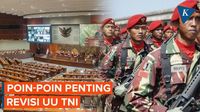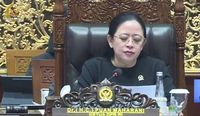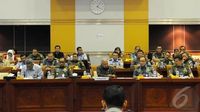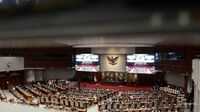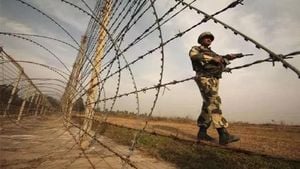Indonesia stands on the cusp of a significant transformation in its military governance, as the Dewan Perwakilan Rakyat (DPR) prepares to ratify the RUU TNI, revising Law Number 34 of 2004 concerning the Tentara Nasional Indonesia (TNI). This revision, which has attracted considerable attention and public debate, is set for approval today, March 21, 2025. The proposed changes highlight pivotal shifts in the military's role in relation to civilian governance and raise vital questions about the future structure of the TNI.
As reported by Liputan6, among the key highlights of the RUU TNI is the proposal to expand the opportunities for active TNI soldiers to occupy civilian positions across 14 to 16 ministries and agencies, including vital security and defense sectors such as the BNPB, BNPT, and the Ministry of Marine Affairs and Fisheries. This controversial move has sparked fears regarding a potential return to the military's dual-functionality that characterized Indonesian politics during the New Order era.
During a heated plenary session, which took place on March 20, 2025, the DPR officially approved the bill into law. The meeting was led by DPR Chair, Puan Maharani, and attended by key figures including Defense Minister Sjafrie Sjamsoeddin and TNI Commander General Agus Subiyanto. Maharani posed the crucial question to the assembly: “Can the Draft Law regarding the Change to the Law Number 34 of 2004 concerning the Indonesian National Army be approved for ratification?” This query was met with unanimous agreement from the attendees.
The changes proposed under the RUU TNI revolve around several fundamental aspects. For instance, Article 3 maintains that the TNI will remain under the president with regard to the deployment and use of military force. Furthermore, Article 7 expands the TNI's primary duties from 14 to 16, introducing new responsibilities such as assisting in countering cyber threats and protecting Indonesian citizens and national interests abroad.
The legislation promises to enhance the professionalism of the TNI as well. Proposals include increasing the retirement age for soldiers; enlisted and non-commissioned officers are now proposed to retire at age 55, slightly up from the previous 53, while officers will retire between the ages of 58 and 62 depending on their rank. Significantly, senior officers, particularly four-star generals, may extend their service to 63 years or even 65, a notable shift from the previous legal framework.
Amidst the legislative discussions and changes, the concern of maintaining civilian supremacy remained a priority. The RUU TNI explicitly ensures that political and governmental decision-making power stays firmly in the hands of civilian entities. TNI's involvement in political processes is strictly limited, reaffirming the need for an apolitical military focused solely on its defense and national security mandate.
Nevertheless, the prospect of active TNI personnel taking up civilian roles has drawn intense scrutiny and opposition from various segments of society. Reports indicate that civil elements and students have been gathering outside the parliament since early morning on March 20, staging protests against the bill. Protesters expressed their concerns about the implications of the military's potential resurgence into civilian governance structures.
The newly ratified RUU is also designed to enhance the TNI's capabilities in humanitarian assistance during natural disasters and emergencies, establishing a clear mandate for them to assist local communities in times of need. This dimension of the legislation aims to portray the TNI as a force that contributes positively to public welfare beyond its traditional military role.
Additionally, the RUU TNI stipulates reforms to the organizational structure of the TNI. The revisions promote greater coordination among the different branches of the armed forces, which is aimed at improving operational efficiency and preparedness against diverse threats. The focus on more integrated military operations signifies an adaptation to the complexities of modern warfare and humanitarian missions.
While the RUU TNI aims to solidify the TNI's role as a professional and honorable institution, critics worry about the potential for excessive military influence in civilian affairs—an echo of Indonesia's turbulent political past. However, the government emphasizes that these changes align with democratic values, ensuring that all revisions meet national and international legal standards.
In summary, as the clock ticks toward the DPR's formal ratification of the RUU TNI, the fate of Indonesia's military and governance structure stands poised for what could be an era of significant change. By reaffirming civilian supremacy, enhancing the professionalism of the TNI, and maintaining a clear division from civil governance, the Indonesian government seeks to evolve the TNI into a modern military institution while addressing pressing national security needs.
As the people of Indonesia watch closely, the coming days will reveal not only the practical implications of the new law but also the response of various stakeholders within society. With ongoing protests and discussions surrounding the legislation, it remains clear that the public dialogue surrounding the TNI remains deeply vital to the future of Indonesia’s democracy.
